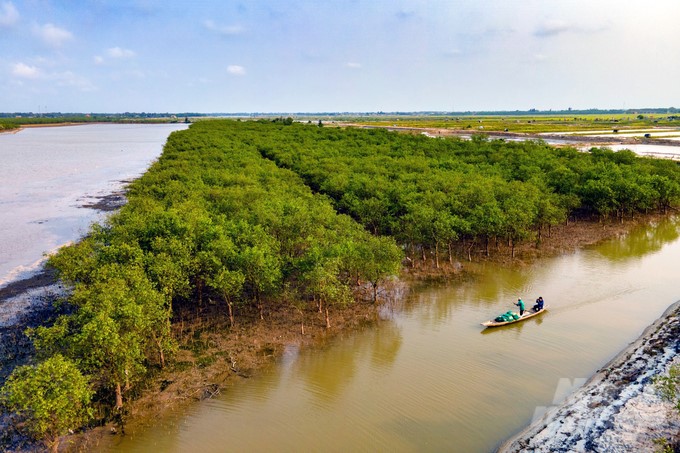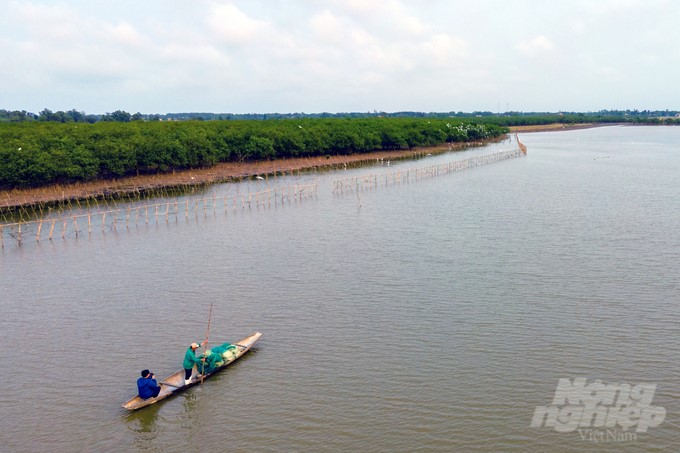November 27, 2025 | 17:18 GMT +7
November 27, 2025 | 17:18 GMT +7
Hotline: 0913.378.918
November 27, 2025 | 17:18 GMT +7
Hotline: 0913.378.918

Mangroves become "treasures" for the people of Bac Phuoc Island. Photo: Vo Dung.
Taking us to see the results of the dyke and mangrove forest protection work, Mr. Truong Xuan Luat, Head of Bac Phuoc village, shared with full excitement: "After the dyke and mangrove apple forest were established, there have been many changes in the people's lives".
Now in every rainy season, the people here are less worried about landslides. They no longer have to run away from storms and floods, or struggling to make end met. This land’s children no longer go away from home to make a living around the country.
Over the years, the mangrove apple forest, which has become more and more solid as a green wall, along with the dyke surrounding the villages, has blocked the water waves to help people feel secured while living their lives and performing aquaculture and agricultural production.
"Having realized the great value of the mangrove forest and dyke line, the people of Bac Phuoc Island have tried to protect and preserve them for many years. Bac Phuoc Island is home to many species of seafood and wild birds and has become a sustainable livelihood for many households in the area. Preserving the mangrove apple forest and protecting the dyke line means protecing the next generations," said Mr. Truong Xuan Luat.
Previously, people living on Bac Phuoc Island faced many difficulties because of the harsh and unusual weather. Located at the gateway to the sea on the Thach Han River, in every season of storms, floods, and high tides, many dikes surrounding residential and production areas built by people are eroded. As a result, a large part of the crop area was washed away. The land was flooded with salt, making it unable to cultivate, and people's lives were thus surrounded by poverty.
"That is the constant concern of the Party Committee, the government, and the people of Trieu Phuoc commune. No one wishes to leave their birthplace. But thanks to the mangrove apple forest, many households’ livelihoods are guaranteed. The environment becomes green, clean, and beautiful. Those positive changes make many people love their homeland even more," said Mr. Nguyen Van Vui, Chairman of the Trieu Phuoc Commune People's Committee.
The year 2006 marked the great change in this land. A 7.6-km-long dyke surrounding the village was constructed at a cost of tens of billions of dongs. In order to protect the dyke, with the support of the Central Government’s National Target Program on dyke upgrading and protection, a mangrove apple forest was also planted and taken care of.
The mangrove apple forest grew thanks to the protection efforts of the people and local authorities. This forest model blocked the waves and wind, protected villages and people, attracted many seafood species to sellte down in the area. The mangrove apple forest created landscapes, improved the ecological environment for the region, and contributed to preserving biodiversity.

Thanks to mangroves and breakwaters, the people's lives on Bac Phuong Island have become less destitute. Photo: Vo Dung.
The people of Bac Phuoc Island now protect the dyke and mangrove apple forest like they are protecting the village's treasures. Bac Phuoc Island currently has more than 40 ha of mangroves, mostly mangrove apple trees that are growing well.
Living under the protection of the dyke and mangrove apple forest, the people's lives here have prospered. Agricultural production has gradually stabilized. People no longer have to struggle to bring food on the table. The source of seafood exploited from the mangroves has ensured the people’s livelihood.
Mr. Truong Xuan Luat said, "Bac Phuoc Island has now lost its 'poverty specialty'. Instead, thanks to the effectiveness of the dyke and mangrove apple forest, people's lives have gradually improved. In the future, Bac Phuoc Island can also become a place to organize experiential tourism and ecotourism activities. This will give this land’s people the opportunity to develop more service industries and strive to become rich".
Bac Phuoc Island (Trieu Phuoc commune, Trieu Phong district, Quang Tri province) is isolated and nestled between two branches of the Thach Han river. This island area is only about 4 km2 wide, with 341 households and more than 1.4 thousand people in three villages: Duy Phien, Ha La, and Duong Xuan.
Translated by Huyen Vu

(VAN) According to Mr. Vo Minh Thanh, Director of the Tay Ninh Department of Agriculture and Environment, Resolution 57 has created a new development pathway for the locality, shifting from traditional toward modern agriculture.
/2025/11/26/4909-2-154329_878.jpg)
(VAN) Pearl grouper farming in HDPE cages not only delivers economic efficiency but also contributes to protecting the environment, creating jobs, and promoting marine-based experiential tourism.

(VAN) The model of making a living under the forest canopy through the agroforestry system in Van Son commune, Bac Ninh province, is expected to generate an annual income of approximately VND 30 million/ha.

(VAN) Many enterprises in Can Tho are harnessing natural energy and reducing greenhouse gas emissions in their production processes, thereby contributing to the promotion of a sustainable green transition.
/2025/11/24/3536-2-112800_176.jpg)
(VAN) Dong Nai now has tens of thousands of hectares of forests certified for sustainable management, and this area will continue to be expanded in the coming period.

(VAN) Vinh Ha hamlet (Dai Xuyen commune, Hanoi) is shifting away from small-scale farming as households adopt bioscurity into their breeder chicken models.

(VAN) Heavy rains make aquatic species more vulnerable to disease. Proactive water management and high-tech systems help farmers prevent outbreaks and protect yields.